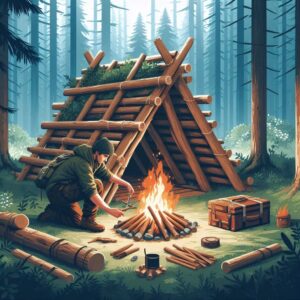Alright, nature enthusiast, let’s talk about the great outdoors. Whether you’re camping under the stars, hunting for that elusive deer, hiking up a mountain, or just trying not to get lost in the woods, having some solid tips up your sleeve is like having a secret map in a video game—it just makes everything easier.
So, let’s break down survival tips into bite-sized bits of wisdom that’ll keep you safe, sound, and maybe even a little bit smug when your friends are still trying to figure out which way is north.
I’ve got some outdoor tips that’ll help you avoid common pitfalls—like getting lost or accidentally befriending a bear. So grab your gear and let’s dive into the wild world of outdoor adventures!
Camping: Because Your Tent Isn’t Going to Pitch Itself
 So, you’ve decided to spend the night under the stars instead of in your cozy bed. Good for you! Camping is great until you realize you forgot to pack the marshmallows. But before you start roasting marshmallows, you need to set up camp—preferably without turning it into a scene from a disaster movie.
So, you’ve decided to spend the night under the stars instead of in your cozy bed. Good for you! Camping is great until you realize you forgot to pack the marshmallows. But before you start roasting marshmallows, you need to set up camp—preferably without turning it into a scene from a disaster movie.
Pick the Perfect Spot: Don’t just plop down anywhere; look for flat ground away from water sources (you don’t want to wake up in a surprise swimming pool). Look for flat, level ground that’s not in a ditch or low spot (unless you’re into sleeping in puddles).
Avoid camping too close to rivers or lakes—sure, the view is nice, but waking up in a soggy sleeping bag isn’t. Also, check for overhead branches that look like they’re ready to drop at any moment. Trust me; nobody wants to be woken up by a falling tree limb.
Check for Creepy Crawlies: Before you set up your tent, check the ground for any anthills, beehives, or other surprise roommates. You don’t want to wake up with ants in your pants—literally.
Set Up Before Dark: Trying to set up your tent in the dark is like trying to assemble IKEA furniture without instructions. It can lead to confusion and possibly some very interesting new words. Get your tent set up while it’s still light out so you can enjoy the evening instead of wrestling with poles.
Don’t Forget the Firewood: If you’re planning to have a campfire, gather your wood before it gets dark. Stumbling around in the pitch-black trying to find sticks is about as much fun as stepping on a Lego in the middle of the night.
Food Storage: You’re not the only one who likes snacks—bears, raccoons, and squirrels do too. Animals have this incredible knack for sniffing out snacks. Store your food in airtight containers and hang it from a tree if you’re in bear country. Remember, a fed bear is a dead bear—so don’t leave your Doritos lying around.
Hunting: Channeling Your Inner Predator (Safety First!)
 Hunting is more than just sitting quietly in the woods, hoping something wanders by. It’s about patience, skill, and knowing when to take the shot (and when not to). Remember that safety should always come first. Here are some tips that might save you from looking like an extra in a horror movie:
Hunting is more than just sitting quietly in the woods, hoping something wanders by. It’s about patience, skill, and knowing when to take the shot (and when not to). Remember that safety should always come first. Here are some tips that might save you from looking like an extra in a horror movie:
Know Your Quarry: Before you even step foot in the woods, make sure you know what you’re hunting and how to do it legally and ethically. Research the animal’s habits, tracks, and what times they’re most active. Hint: deer don’t usually hang out in your backyard at noon.
Stay Downwind: Animals have an uncanny ability to smell you coming from a mile away, especially if you’re downwind. Make sure the wind is blowing from the animal to you, not the other way around. Think of it like sneaking up on your little brother—you don’t want him to smell you coming, right?
Blend In: Camouflage isn’t just for looking cool—it’s for not standing out like a neon sign in the middle of the woods. Wear colors that match your environment and move slowly. Quick movements can spook animals faster than you can say, “There goes dinner.”
Wear Blaze Orange: If you are not in a survival situation and just out on a hunting trip, safety dictates that you wear an orange vest. No one wants friendly fire incidents ruining their day—or life—so wear bright colors! This way, other hunters will see you coming from miles away. You’ll stand out like a sore thumb but in a good way.
Know When to Call It a Day: Sometimes, despite your best efforts, you’re not going to bring home anything but an empty cooler. That’s okay! The woods will still be there tomorrow, and so will the animals. Hunting is as much about enjoying nature as it is about filling the freezer.
Know Your Target: Always identify what you’re shooting at before pulling the trigger. A squirrel may look cute and all, but if you mistake it for Bambi’s cousin, things could get awkward fast.
Stay Hydrated and Snack Smart: Bring plenty of water and snacks—preferably ones that don’t involve messy wrappers (because no one likes cleaning up after themselves in the wilderness). Trail mix is great because it gives you energy without making you feel like you’ve eaten an entire pizza.
Hiking: Walking in Nature Without Losing Your Way (Or Your Cool)
 Hiking can be as relaxing as sipping lemonade on your porch or as exhausting as running after ice cream trucks on hot summer days. Hiking is like a choose-your-own-adventure book, except you’re the main character and the plot twist is finding your way back to the car. Here’s how to make sure you enjoy the journey and don’t end up as the subject of a search-and-rescue mission. Here are some tips:
Hiking can be as relaxing as sipping lemonade on your porch or as exhausting as running after ice cream trucks on hot summer days. Hiking is like a choose-your-own-adventure book, except you’re the main character and the plot twist is finding your way back to the car. Here’s how to make sure you enjoy the journey and don’t end up as the subject of a search-and-rescue mission. Here are some tips:
Plan Your Route: Know where you’re going! Use maps or apps so you won’t end up wandering around aimlessly like someone who lost their car keys… again.
Map and Compass: GPS is great until it isn’t. Always carry a map and a compass, and actually know how to use them. And no, just turning the map until it matches the landscape doesn’t count.
Dress in Layers: The weather in the mountains can change faster than you can say “burr.” Dress in layers so you can add or remove clothing as needed. Better to carry an extra sweater than to shiver your way through the hike.
Stay on the Trail: Sure, blazing your own trail sounds adventurous, but it’s also a great way to get lost. Stick to marked paths—trust me, they’re there for a reason. Besides, wandering off-trail might lead you into poison ivy, and that’s a souvenir nobody wants.
Leave No Trace: Take only pictures; leave only footprints (and maybe some embarrassing stories). Respect nature by packing out everything you bring in—even those snack wrappers!
Bring Snacks and Water: Hiking burns a lot of energy, and you don’t want to run out of fuel halfway up a mountain. Pack high-energy snacks like nuts, dried fruit, and energy bars. And don’t forget the water—dehydration is no joke, and there’s nothing worse than running out of water with miles to go.
General Survival: The Basics of Not Becoming Nature’s Lunch
 Whether you’re camping, hunting, hiking, or just out exploring, knowing some general survival skills is like having a secret weapon. These tips are the glue that holds all your outdoor adventures together. Now let’s talk survival skills because sometimes things go sideways faster than you’d think:
Whether you’re camping, hunting, hiking, or just out exploring, knowing some general survival skills is like having a secret weapon. These tips are the glue that holds all your outdoor adventures together. Now let’s talk survival skills because sometimes things go sideways faster than you’d think:
Fire Starting: Knowing how to start a fire is one of the most important skills you can have. It’s not just for warmth—it’s for cooking, signaling for help, and keeping predators at bay. Practice starting a fire with matches, a lighter, and even a flint and steel. Just remember, Smokey the Bear wasn’t kidding about preventing wildfires—always keep an eye on your fire and make sure it’s completely out before you leave.
Shelter Building: If you’re caught out in the wild without a tent, you’ll need to know how to make a shelter. Look for natural materials like branches, leaves, and pine needles to create a shelter that’ll keep you dry and warm. It doesn’t need to be fancy, just functional—think of it like building a pillow fort, but with more sticks and fewer cushions.
Learn Basic Navigation: Knowing how to read a map and use a compass can prevent panic attacks when your GPS loses signal (which it will at the most inconvenient time possible). Remember that even Google Maps doesn’t know everything about backcountry trails!
First Aid Knowledge Is Key: Accidents happen—trust me; I once tripped over my own shoelaces while walking uphill. Pack a first aid kit and learn basic skills like how to clean wounds or treat blisters before they become major drama queens.
Signal for Help: If you ever get lost or need to signal for help, knowing how to do it properly is key. Three of anything (whistles, flashes of light, fires) is the international distress signal. So, if you’re in trouble, remember: three’s the magic number.
Stay Calm and Think: The most important survival tool you have is your brain. If you find yourself in a sticky situation, don’t panic. Stop, think, and make a plan. Panicking never helped anyone—unless you’re trying to win a screaming contest.
Final Thoughts: Because the Outdoors is an Adventure, Not a Test
The outdoors is an amazing place, full of beauty, challenges, and yes, the occasional mosquito. Nature is amazing but can also be unpredictable. Whether you’re camping under the stars, stalking through the woods, or hiking up a mountain, the key to having a great time is being prepared and staying smart.
Remember these tips, pack wisely, and don’t forget to enjoy the journey. Whether you’re roasting marshmallows over the campfire or tracking game through the woods, stay safe—and maybe practice that bear dance just in case! After all, nature isn’t just something to survive—it’s something to savor. Now go out there and make some memories, and maybe try not to get lost while you’re at it!
